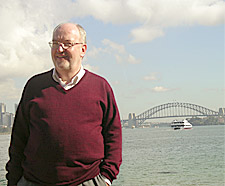 A British church leader has encouraged Australian evangelicals to stand firm against the homosexuality crisis tearing apart the Anglican world.
A British church leader has encouraged Australian evangelicals to stand firm against the homosexuality crisis tearing apart the Anglican world.
"Internationally, the Anglican Communion is in crisis," the Bishop of Lewes, Wallace Benn told Sydneyanglicans.net in Sydney last week.
"It is very important for evangelicals to network, to share fellowship and to encourage each other in their faith [in order to] strengthen evangelical roots and ties," he said.
"If the North American radical liberals are not disciplined, it is almost inevitable there will be a major split."
Bishop Benn, president of the Church of England Evangelical Council, its most representative evangelical body, provided Bible studies from Philippians at the national conference of the Evangelical Fellowship in the Anglican Communion (EFAC) on the weekend.
He is known to many in Sydney after leading the Bible studies sessions at the Archbishop's election Synod in 2001.
Bishop Benn urged international Anglican leaders to turn back to the teaching of the Bible to avoid further division.
The current crisis stems from the United States, where an active homosexual man was made a bishop in 2003.
"The future of the Communion is a return to biblical and orthodox faith and if our leaders stand firm on that we won't split" other than the North American churches," Bishop Benn said.
He would not be drawn into the debate over a fellow evangelical colleague, Richard Coekin, who last week had his license as a minister reinstated, only stating he was "very happy' that the Archbishop of Canterbury had upheld Mr Coekin’s appeal.
Mr Coekin, senior pastor of Dundonald Church in Wimbledon, was stripped of his licence by the Bishop of Southwark Tom Butler earlier this year because he organised for three ministers to be ordained by a visiting bishop from the Church of England in South Africa (CESA), a church not in communion with the British Church.
The move was part of a dispute following Bishop Butler's support for the Church of England's controversial move to allow homosexual priests to enter civil partnerships with their partners provided they remain celibate.
Evangelical gathering combats isolation
The five-yearly EFAC conference drew 120 people from every state in Australia and also New Zealand to Port Hacking in the Royal National Park.
The conference was themed "growing gospel passions' and seminars were held on a wide range of topics that included church planting, rural ministry, reaching the Asian community, technology, bioethics, fundraising, world mission and creating a culture of evangelism in local churches.
The gathering aimed to provide much-needed fellowship for evangelicals in non-evangelical and regional dioceses across the country.
Speakers included the President of EFAC, Archbishop of Sydney Peter Jensen, who gave the opening address on "Passion for Christ', Melbourne bishop Stephen Hale on "Bishops hindering or helping church renewal' and Sydney layman Robert Tong, who is on the Archbishop of Canterbury's Panel of Reference [a committee set up to deal with the homosexuality crisis] who gave an update on the state of the Anglican Communion.
Other speakers included Ross Nicholson, rector of Launceston; Lyn Sarah of Holy Trinity Adelaide; Peter Brain, Bishop of Armidale; Martin Foord, a former Sydney minister now lecturing at Perth’s Trinity Theological College; Stuart Robinson, General Synod's National Missioner and Tim Patrick, evangelism minister at St Jude's, Carlton in Melbourne.
David Hanger, Rector of the northern NSW parish of Nambucca Heads said he and his wife Leone were the only clergy couple from the Diocese of Grafton he knew were attending the conference.
"[EFAC is] an encouragement for evangelicals who are isolated " it's an opportunity for fellowship and networking and a weekend of good teaching" said Archdeacon Hanger, who is also the Diocese of Grafton's representative on the EFAC NSW Executive.
He said it is a "disappointment and a challenge' that more ministers from Sydney Diocese are not involved with the organisation.
"There aren't many Sydney clergy who are members" evangelicals need to support each other and encourage each other and offer ministry to [men and women] who are standing up for the gospel in areas where it is harder to than Sydney," he said.
EFAC Vice President Trevor Edwards, an assistant bishop in the Diocese of Canberra-Goulburn agreed that the sheer size of the country means "it's important for like-minded people to network' and said if EFAC doesn't make that possible, no one will.
"[We're] scattered all over the country," Bishop Edwards said. "In Sydney people have the luxury of supporting one another by going to the next parish or the next suburb."
EFAC Chairman, Bishop of North Sydney Dr Glenn Davies said the conference was not designed to be political, unlike its counterpart in the United Kingdom which meets every five years before and after the Lambeth conference.
"The purpose of the conference is to build evangelical Anglican networks " I want to see an outcome that really does strengthen evangelical networks " [so] they know to whom they can speak to," Bishop Davies said.
He said fellow evangelicals could help each other in practical ways such as how to write newsletters and run missions.
For more information visit the EFAC web site




















